As we step into September, the anticipation surges for the ’grand finale’ of the UEFA Champions League (UCL) in its current format, a system in place since the memorable 1992/93 season, when Olympique de Marseille clinched the inaugural rendition. From the 2024/25 season, all UEFA competitions are set to embrace a fresh format, marking a significant evolution in the tournament's history. This renders the current UCL season truly exceptional, infusing every match and moment with an extra layer of significance, making triumphing in it all the more remarkable.
Long-lost acquaintances
Thirty-two teams embark on the final Champions League in this format, including the most successful teams in the series and clubs that have been absent from the UCL for a while. For example, Royal Antwerp FC last played in the competition’s predecessor the European Cup, in the 1957/58 season and have never made it to the Champions League group stages. Similarly, it has been a while since Newcastle United and RC Lens played in the UCL: exactly 21 years ago in the 2002/23 season. Arsenal FC, last year’s Premier League runners-ups return after a six-season absence. In total, 19 out of last year’s 32 group stage participants are present once again.
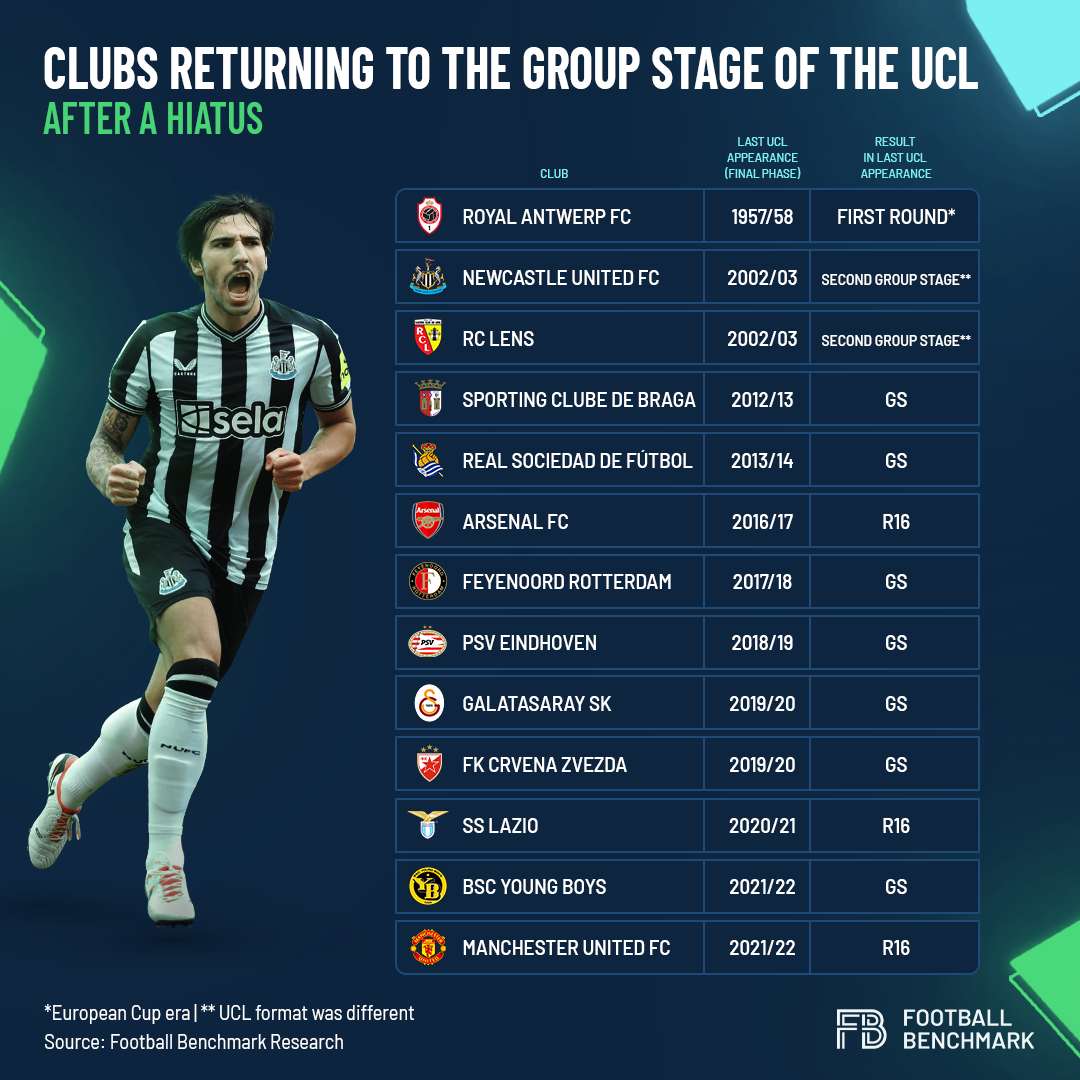
Real Madrid have won the series on a total of fourteen occasions since 1955, making them the club with the most titles in the history of the competition. However, according to Pep Guardiola, defending champion Manchester City are on the right path to catch up with the record champions. Speaking to the press after City’s UCL win against Internazionale, Guardiola issued a warning to “Los Blancos”:
"We are just 13 Champions League titles away ... so be careful Real Madrid because we are on our way. So if you slip a little bit, we will catch you", he declared with a big smile.
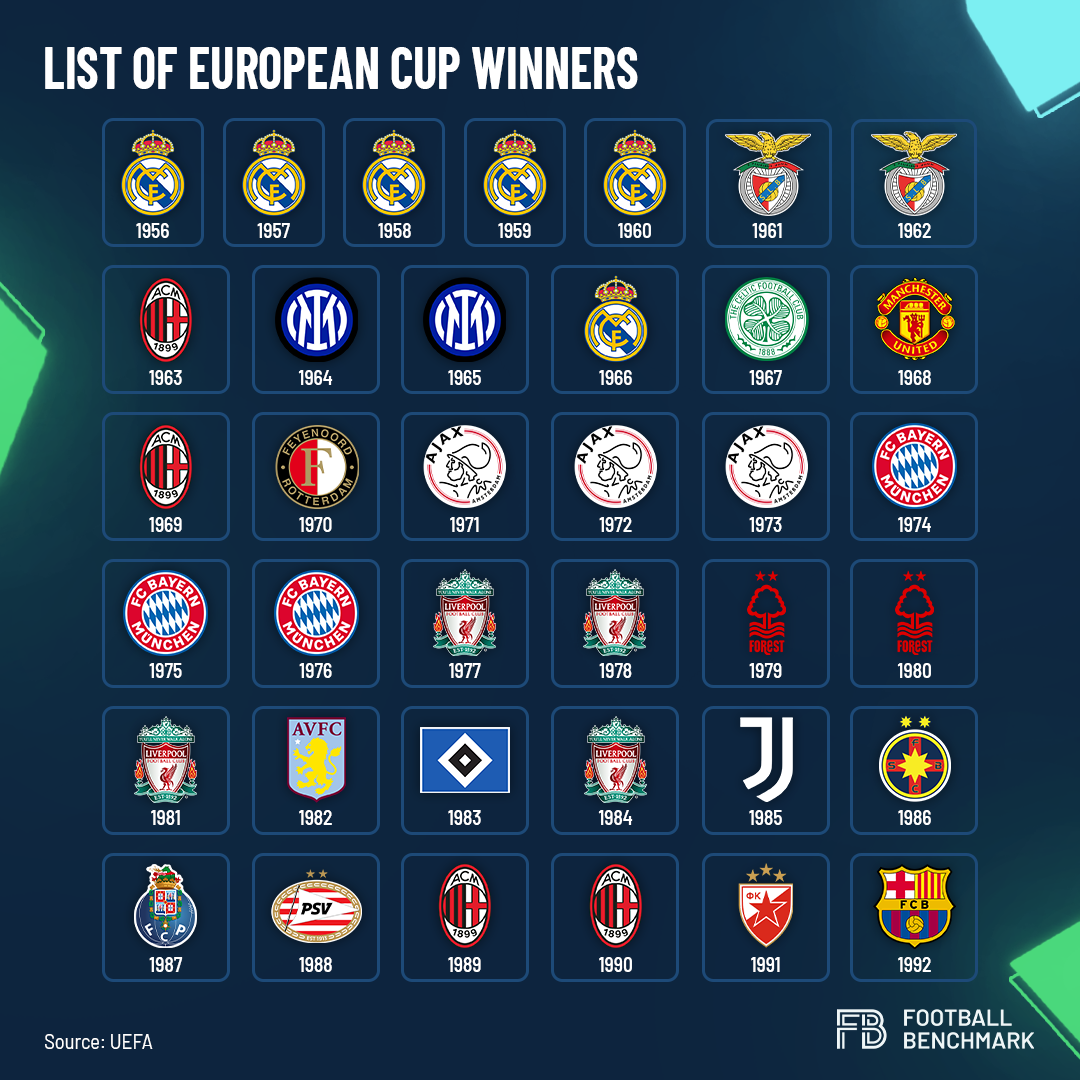
In this UCL season, we will witness the participation of the top five clubs with the most UEFA Champions League (or European Cup) titles: Real Madrid (14), AC Milan (7), Liverpool (6), Bayern München (6), and FC Barcelona (5).
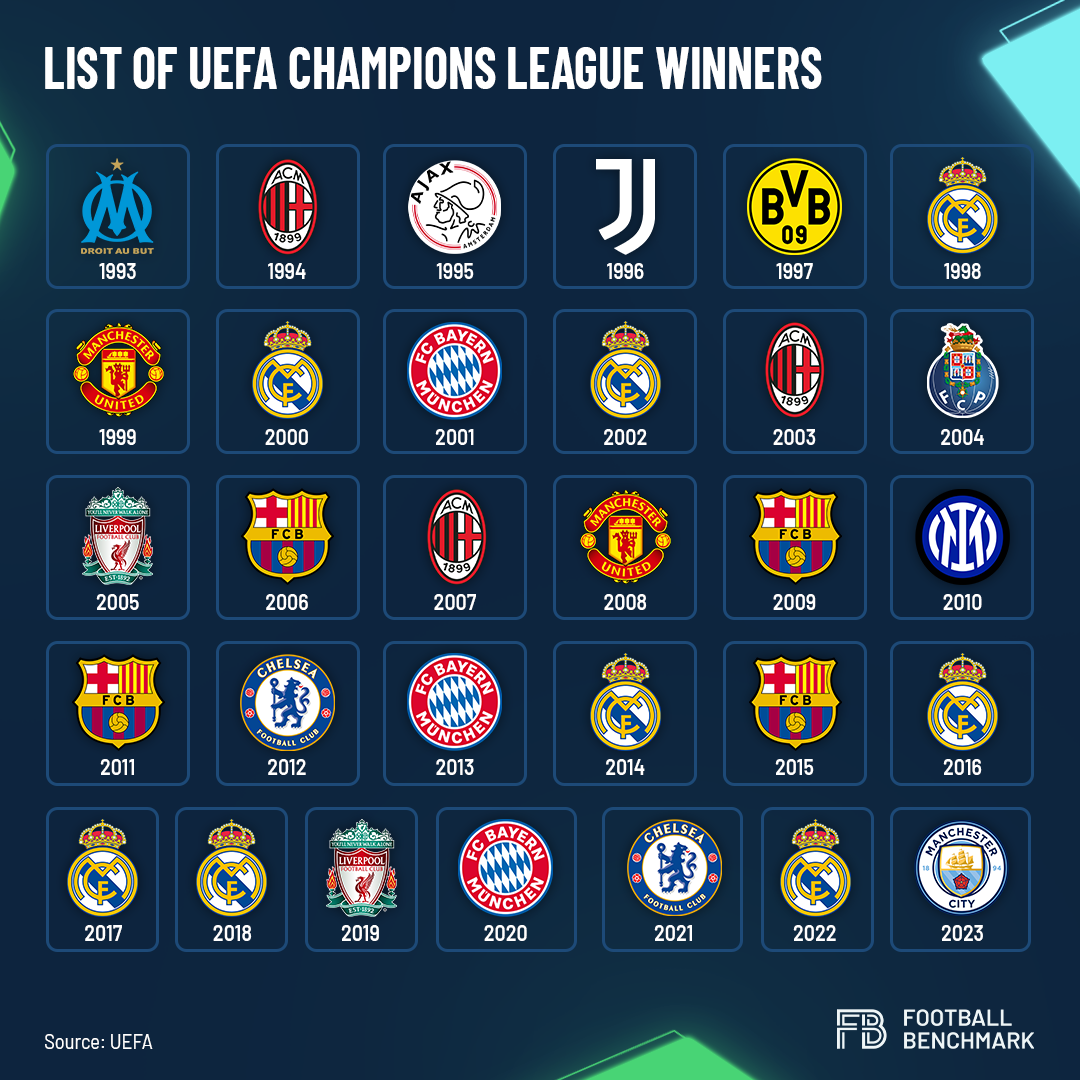
What should we anticipate this year?
Throughout the history of the competition, there have been countless surprises, making it a challenging task to predict what to expect in any given season - who will advance from the group stage or even emerge as the champion. In the following, we will present the market value of the participating teams’ squads, along with the outcomes predicted by betting agencies.
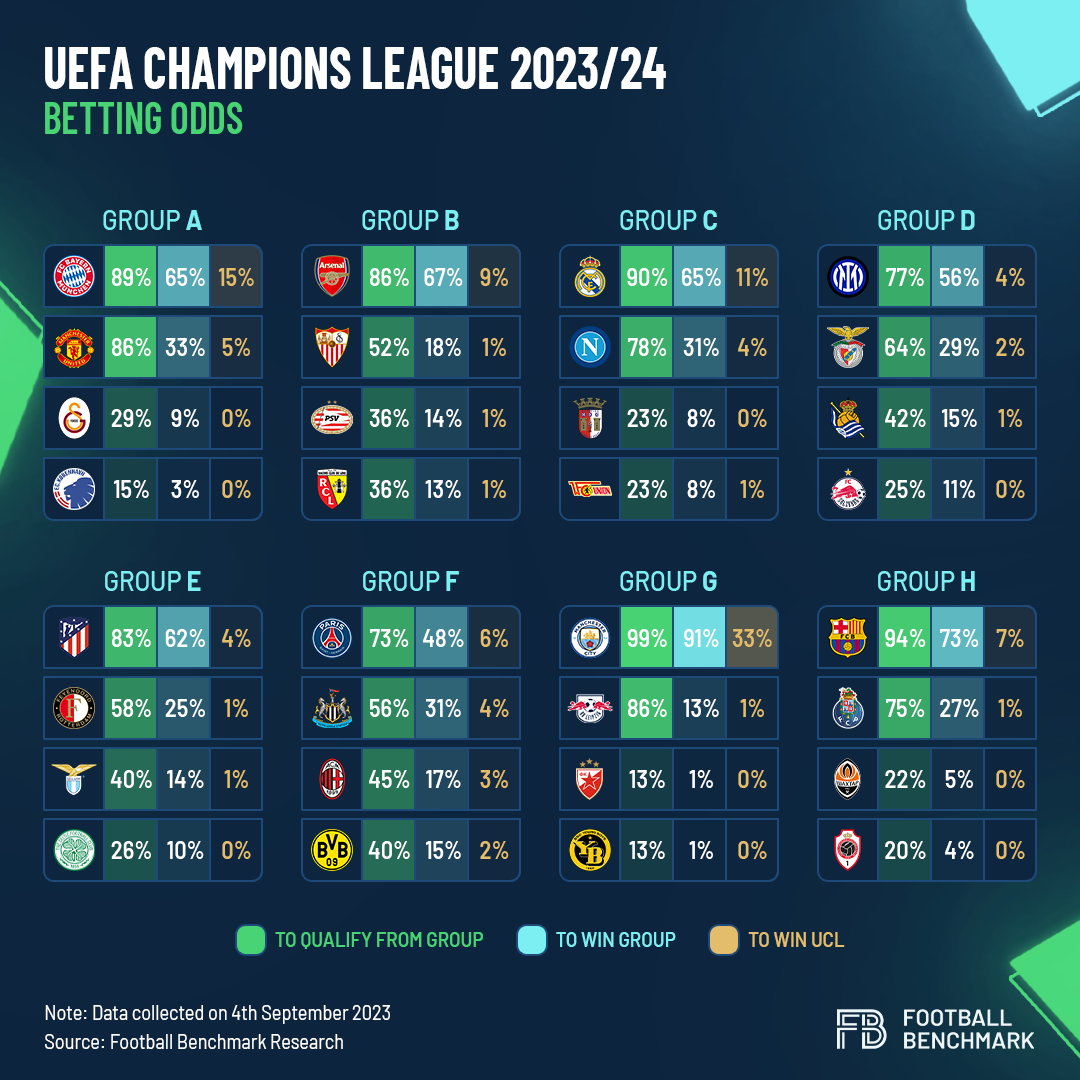
With the highest probability of advancing from their groups, Manchester City, FC Barcelona, and Real Madrid emerge as the top contenders in their respective groups. They are closely trailed by Bayern München and Manchester United, joined by Arsenal, RB Leipzig, and Atlético de Madrid in the race.
According to betting experts, the most intense battles for advancement are anticipated in Group F: all four clubs are given at least a 40% chance to progress to the knock-out rounds.
The reigning champions, Manchester City, are widely regarded as the frontrunners to secure the top spot in their group, with FC Barcelona closely trailing in Group H, and Arsenal poised for success in Group B.
As for the ultimate victory, betting agencies cannot see beyond Manchester City, though Bayern München and Real Madrid are formidable contenders in the race for the title as well. However, City’s 33% probability to win is remarkably high; such a clear domination is rarely seen in the predictions before a UCL season.
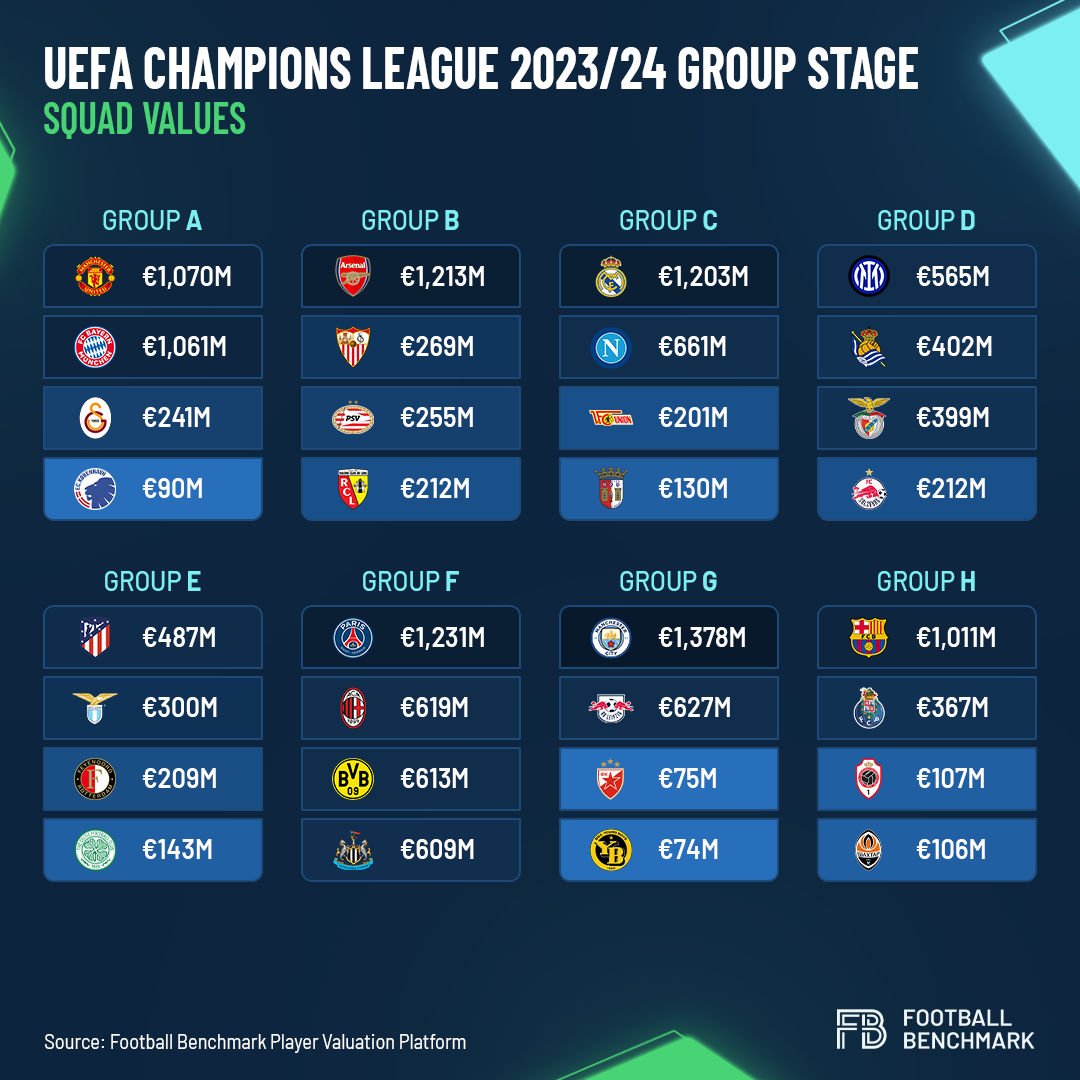
Manchester City have a total squad value of €1,377.6M, the highest among the 32 contenders. There are seven clubs with a squad value above the 1 billion euros threshold besides them: Arsenal and Manchester United from the English Premier League, Real Madrid and Barcelona from LaLiga, Paris Saint-Germain from Ligue 1 and Bayern München from the German Bundesliga.
The solitary group where two clubs from the 'billion-dollar club' will clash is Group A, featuring a rematch of the 1998/99 UCL final, as Manchester United and Bayern München are set to go head-to-head once again.
Group F is one of the most balanced in terms of squad values, as AC Milan (€619.3M), Borussia Dortmund (€612.7M), and Newcastle United (€608.8M) all possess similar valuations, based on our post-summer calculations.
In the group stage, the teams with the lowest squad values, FK Crvena Zvezda (€75.4M) and BSC Young Boys (€73.5M), will face each other in Group G. This sets the stage for a fierce competition between them for one of the advancing spots.
Life after Ronaldo, Messi, and Benzema
This year's Champions League promises to be a truly momentous event, marking not only the final instalment in its current format but also a departure from the familiar presence of footballing legends such as Lionel Messi, Cristiano Ronaldo, and Karim Benzema. These luminaries, who have etched their names in the annals of the sport andhave been the stalwart goal-scorers in the history of this prestigious competition.
Among the current top 10 goal-scorers in the UEFA Champions League, only two will grace the pitch this season: Robert Lewandowski and Thomas Müller.
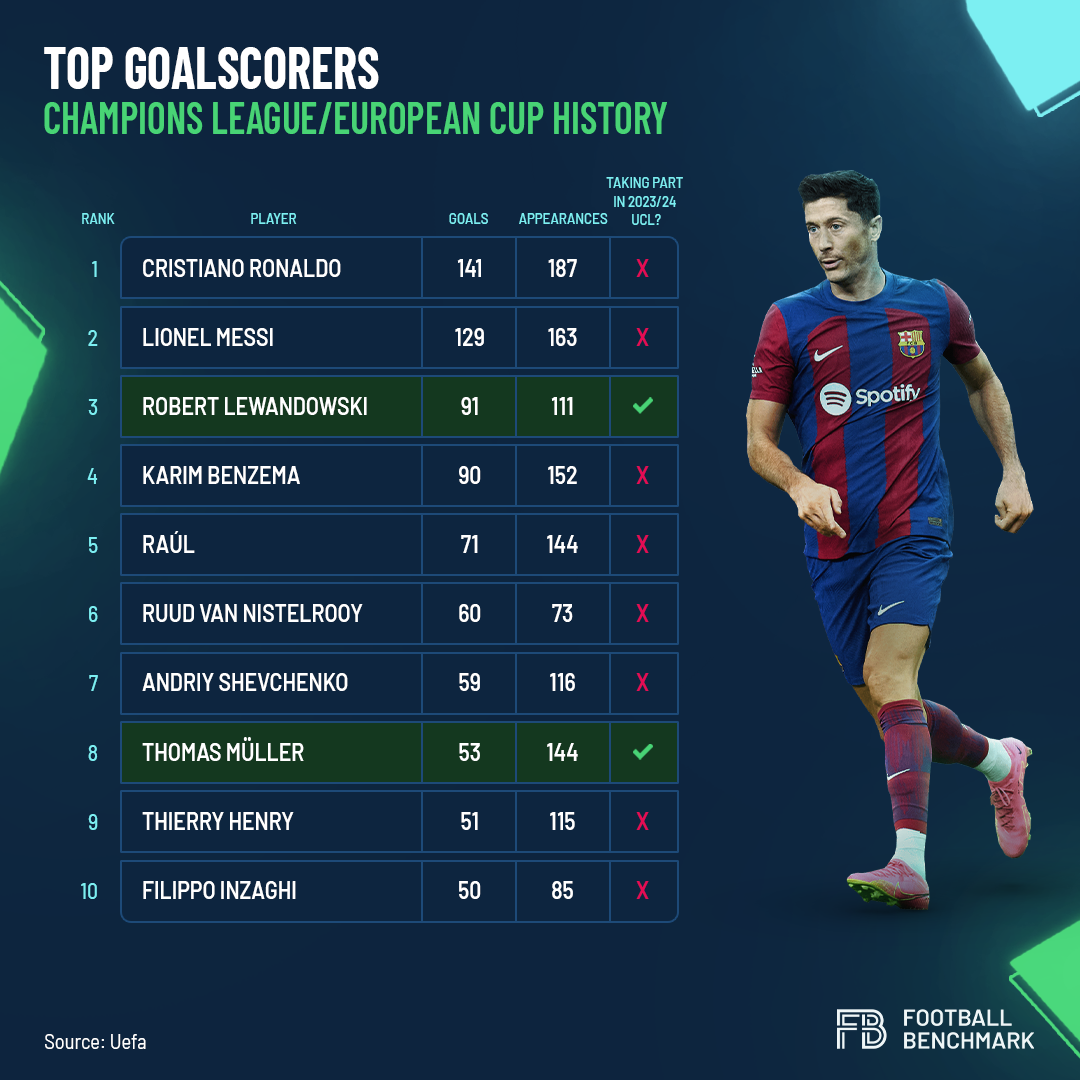
Kylian Mbappé and Erling Haaland are emerging as strong contenders to challenge Cristiano Ronaldo's Champions League goal record. The French superstar already has 40 goals in 61 games, while Haaland - last year’s UCL top goalscorer - boasts an impressive 35 goals in just 30 appearances.
Eyes on the prize money
UEFA has revealed a pivotal facet of the Champions League, outlining the method by which revenue will be distributed among participating teams this season.
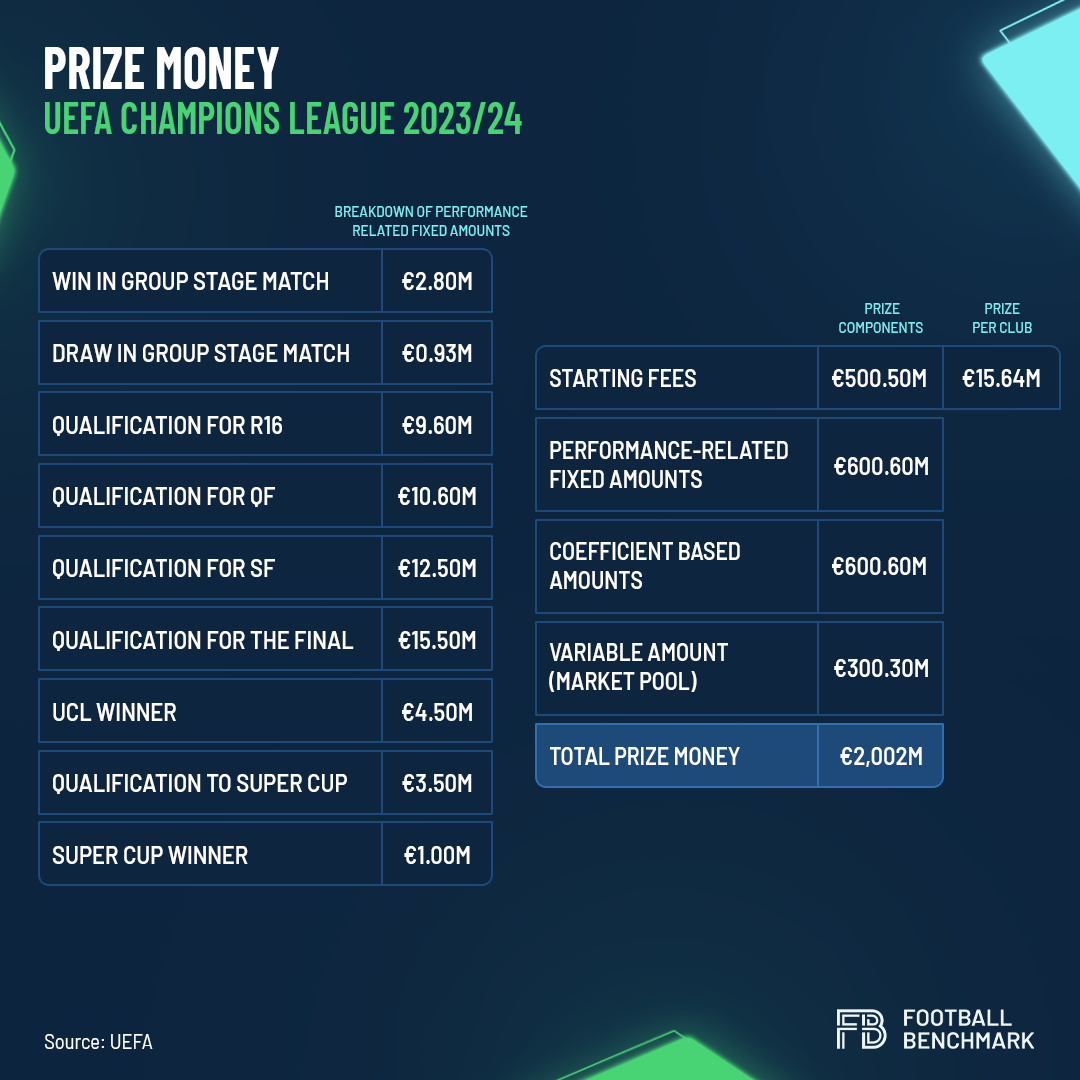
Out of the €2 billion revenue, the allocation for clubs in the Champions League group stage is stratified into four distinct categories:
- 25% will be allocated to starting fees (€500.5m);
- 30% will be allocated to performance-related fixed amounts (€600.6m);
- 30% will be allocated to coefficient-based amounts (€600.6m); and
- 15% will be allocated to variable amounts (market pool) (€300.3m).
UEFA has confirmed that clubs will receive €2.8 million for every victory and €930,000 for every draw. Any undistributed amounts from the performance-related category will be distributed among all clubs in the group stage in proportion to their number of wins.
For the 16 teams advancing to the knockout stages, additional revenue opportunities arise:
- Qualification for the round of 16: €9.6 million per club.
- Qualification for the quarter-finals: €10.6 million per club.
- Qualification for the semi-finals: €12.5 million per club.
- Qualification for the final: €15.5 million per club.
- Winning the UCL: €4.5 million.
The future of the Champions League is exciting
Starting from the next season, the Champions League format will see 36 clubs compete in a single league table, a departure from the current structure of 32 clubs divided into groups. A draw will still occur at the season's start, but solely to determine the fixtures for the league phase. Each club will play eight games - four at home and four away. The 36 teams will be divided into four pots based on rankings. Pot 1 will include the reigning UCL champions and the top eight clubs by coefficient. Unlike before, champions of top domestic leagues and UEFA Europa League titleholders won't automatically get into Pot 1. The draw will pair each club with two teams from different pots for matches.
Following the league phase, the top eight clubs will advance directly to the round of 16. Clubs ranked 9 to 24 will enter a playoff for the remaining eight spots in the round of 16, while those in positions 25 to 36 will exit the competition. Notably, there will be no country-based protection during the knockout rounds, and once a team is eliminated, their European campaign concludes.
For the round of 16 and beyond, there will be a single knockout-round draw, with seeding based on final league-phase positions and no country protection. This emphasizes the significance of finishing high in the league phase, as it can lead to a more favorable knockout path, at least in theory.
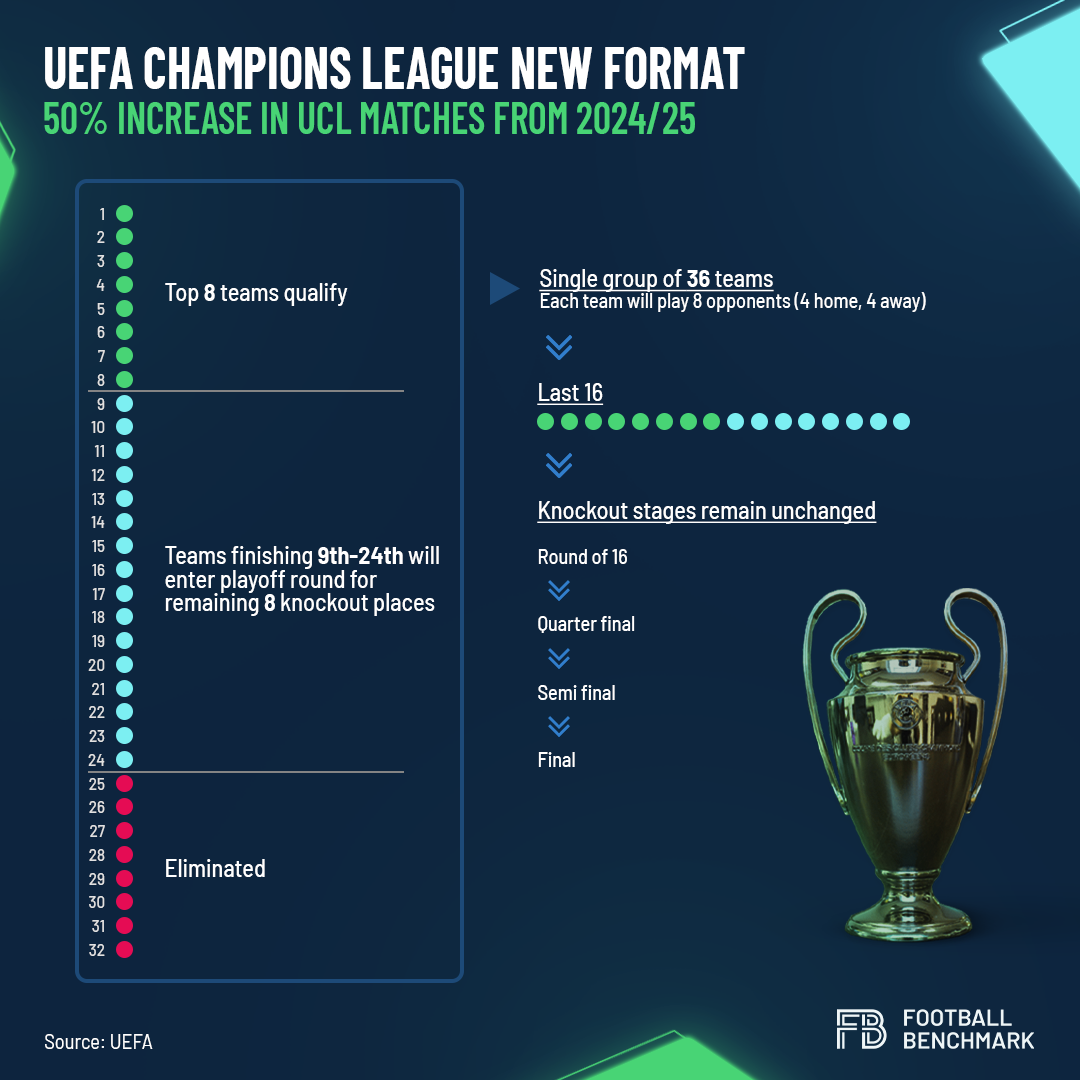
Following the endorsement of a new Memorandum of Understanding, the cooperation and planning between the ECA and UEFA have strengthened. This is evident in the introduction of a fresh revenue distribution model for the 2024-2027 cycle, resulting in a substantial rise in solidarity payments to clubs participating in domestic league competitions.
In the upcoming cycle, clubs not engaged in the league phase of UEFA competitions will now receive a combined share of 10%. This allocation comprises 3% designated for clubs eliminated in the qualifying rounds, and a heightened 7% (up from the existing 4%) for clubs that have had no participation at all, amounting to €440 million per season (€1.32 billion over the cycle).
Furthermore, there is a notable adjustment in the distribution system for participating clubs, with a heightened emphasis on participation (rising from 25% to 27.5%) to be evenly distributed. There is also a significant focus on performance, aligning closely with the European sports model, as opposed to the closed league concept that was central to the Super League proposal. To fund these augmentations, a financial reconfiguration involves the amalgamation of the prior financial distribution structures of market pool and coefficient. Essentially, this constitutes a 10% reduction from 45% to 35%, shifting the financial emphasis away from tradition and 'entitlement' towards recognizing sporting achievement.


